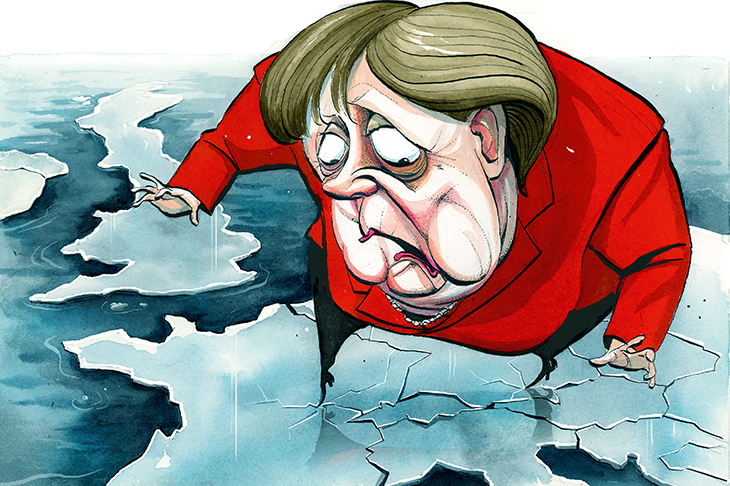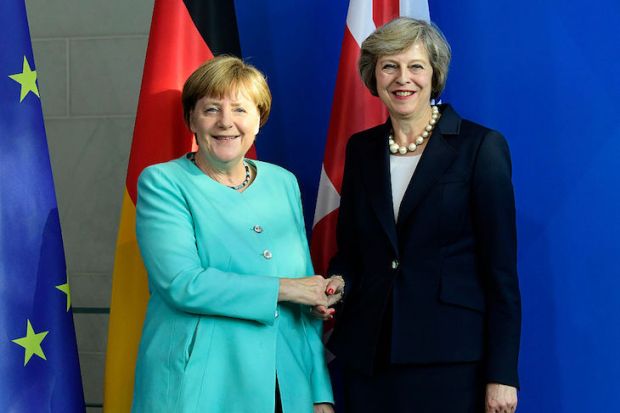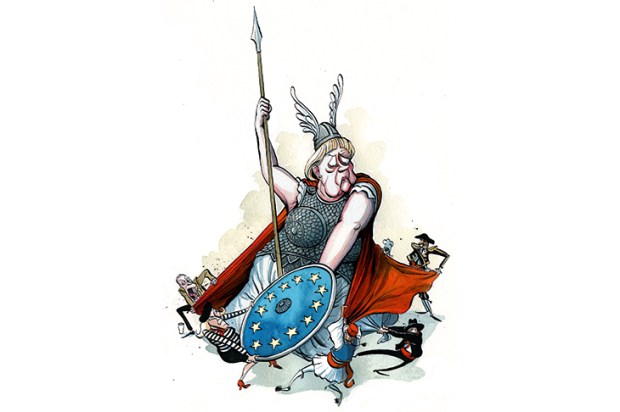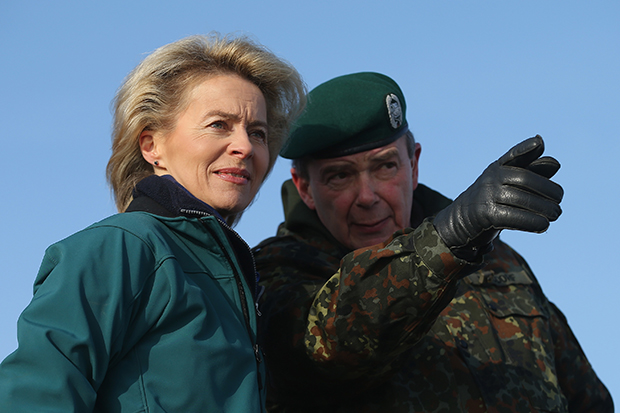Trier, Rhineland
Was it really just a few months ago that Angela Merkel was being hailed as the leader of the western world? A few months since she was lauded as the only politician who could stand up to Trump? How quickly her power has ebbed away. Today she looks defeated, as if she knows her days are numbered. Whenever she goes, however she goes, this is surely the beginning of the end. One German commentator has likened it to Götterdämmerung — the twilight of the gods.
Six months ago, here in the Rhineland, Merkel staged an amazing comeback, beating Martin Schulz’s Social Democrats in his own backyard. Going into that regional election, in North Rhine Westphalia, her Christian Democrats were trailing Schulz’s SPD by 13 per cent. Merkel overturned that massive lead, winning back a state that’s long been an SPD stronghold. From then on, it was clear she would win September’s national election — that much was certain. The only question was, by how much?
Merkel won in September, but by a far smaller margin than she needed, and she’s spent the last four weeks trying to thrash out an alliance with two incompatible partners, Germany’s business-friendly Free Democrats and the idealistic Greens. Last Sunday, it was another Rhinelander, the FDP leader Christian Lindner, who delivered the coup de grâce. Lindner walked out, taking his FDP with him — scuppering these coalition talks, and condemning Merkel to a long and lingering demise. Now the country cannot form a government. As the President of Germany, Frank-Walter Steinmeier, says, ‘It is an unprecedented situation in the history of the Federal Republic.’
Suddenly, all the options look bad for Merkel: a minority government with the Greens (which would be inherently unstable); another grand coalition with Schulz’s SPD (which Schulz has repeated rejected) or another election (which centrists fear would give Germany’s anti-immigration party, Alternative für Deutschland, a further boost). Whichever way she chooses, Merkel looks like a dead woman walking. Now, it’s no longer a question of if she goes, but when.
None of this is good news for Brexit, even if some chauvinist right-wing Brits are licking their lips at the thought of Merkel’s political demise. As James Forsyth reports, the British cabinet fears that Merkel was a less federalist influence on the EU attitude towards Brexit Britain. Who knows what kind of government will now materialise in Germany, given the unprecedented nature of Merkel’s crisis?
Why Lindner walked out isn’t entirely clear, but it looks more like a matter of personalities than policies. The Greens and the CDU maintain that all three parties in these coalition talks (four, if you count the CDU’s Bavarian sister party, the CSU) were pretty close to an agreement before Lindner pulled the plug. As Lindner said himself, ‘Above all, there was no mutual trust.’ That’s the problem with coalitions. Whatever happens, the bigger party always ends up swallowing the smaller party, and come the next election, they get chewed up and spat out again. It happened to the FDP in 2013, and to the SPD in 2017. Lindner wasn’t willing to see the same thing happen again in 2021.
There’s been some talk about the FDP objecting to Green demands to close coal-fuelled power stations, but by far the biggest stumbling block was immigration. The Greens want to reunite recent migrants with their families. Lindner’s FDP want to find new ways of sending illegal immigrants back home. ‘He’s chosen his own brand of populist agitation over political responsibility,’ fumed the Greens’ Reinhard Butikofer. For all the other parties, thwarting AfD is seen as a patriotic duty. By withdrawing from the talks, they fear Lindner has given them a way back in.
‘The FDP is a circus troupe, devoid of true substance,’ tweeted the CDU’s Marco Wanderwitz. ‘A great shame that its leadership has deliberately damaged German democracy.’
The collapse of these talks shows that AfD doesn’t need to win elections to make an impact. Like Ukip, it’s shaping policy without ever getting close to power. In normal circumstances, as leader of the biggest party, Merkel would have looked to the third biggest party to form a government. Because the third biggest party is AfD, who’ve been shunned by all the other parties, Merkel was forced into futile coalition talks with the irreconcilable Free Democrats and Greens. Removing AfD (and their 94 seats) from the electoral equation skews the parliamentary arithmetic, which is why it has proved impossible for Merkel to build a workable coalition this time around.
For Merkel, the breakdown of these talks is uniquely damaging. She’s never been a politician with a consistent ideology. She’s never inspired passionate acclaim. Instead, she’s built a reputation as an honest broker, a pragmatist who’s good at doing deals and getting the job done. ‘I seek cooperation rather than confrontation in politics,’ she says. Now that she’s lost her ability to unite left and right, her natural authority has vanished. She’s like the Cheshire Cat — you need to believe in her, otherwise she’ll disappear.
Merkel is disappearing fast, like her mentor Helmut Kohl before her. Other politicians no longer fear her, which is why Lindner dared to walk out on her. That’s never happened to her before. She’s built three previous coalitions — they’ve never broken down like this one. But until now, she’s only ever had to build a coalition with one other party, never two. That’s a direct consequence of her immigrant policy — the disastrous decision to allow more than a million migrants into Germany, and the subsequent rise of AfD.
So where does Germany go from here? Well, Merkel has suggested she’d rather face another election than form a minority government. The final decision doesn’t rest with her, though, but with the President, Frank-Walter Steinmeier. It’s up to him to call an election, but he says the people have already spoken. The politicians must form a government, he says, rather than going back to the electorate and asking them to vote again.
Yet if no minority government proves workable, and the SPD refuse to rejoin a grand coalition, a fresh election may be the only way to bridge this impasse. Merkel will be hoping voters punish the FDP for scuppering the talks, but that seems optimistic. They might just as easily punish her own CDU party for being unable to see things through. The other parties have nothing to lose from a fresh election. The Greens could do a good deal better. The SPD could hardly do any worse. If AfD win even more votes (and seats) next time, that would create panic in German politics. An even greater mandate than last September (when one in eight Germans voted for them) would be impossible to ignore.
If that happened, Merkel would surely step down, making way for a new Chancellor, traditionally the leader of the biggest party. In every election since the war, that’s been the CDU or the SPD, but for the first time in a long time, there’s something different in the air in Germany.
Here in Trier, the mood encapsulates the uneasy calm in the country as a whole. The medieval Altstadt is aglow with Christmas lights. The shops are full of luxury goods, the cafés are full of fit and prosperous citizens, but why are there so many foreign beggars on the streets?
A great many Germans are disenchanted with the two main parties. Both the CDU and the SPD seem exhausted, bereft of new ideas. Their share of the national vote has been shrinking steadily for years. With his pro-business fiscal policies, and his dynamic, youthful image, 38-year-old Lindner has a lot in common with Macron. Could he transform the FDP into a Teutonic version of La République En Marche? Unlikely, but in these turbulent times, anything seems possible. ‘It’s better not to govern, than to govern falsely,’ tweeted Lindner, after walking out of these coalition talks and sparking this crisis. It could almost be a mantra for the difficult days ahead.
Got something to add? Join the discussion and comment below.
Get 10 issues for just $10
Subscribe to The Spectator Australia today for the next 10 magazine issues, plus full online access, for just $10.
You might disagree with half of it, but you’ll enjoy reading all of it. Try your first month for free, then just $2 a week for the remainder of your first year.














Comments
Don't miss out
Join the conversation with other Spectator Australia readers. Subscribe to leave a comment.
SUBSCRIBEAlready a subscriber? Log in